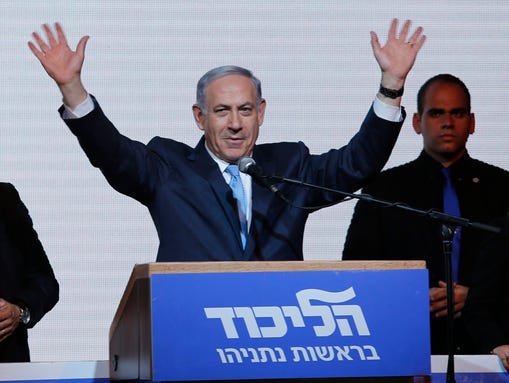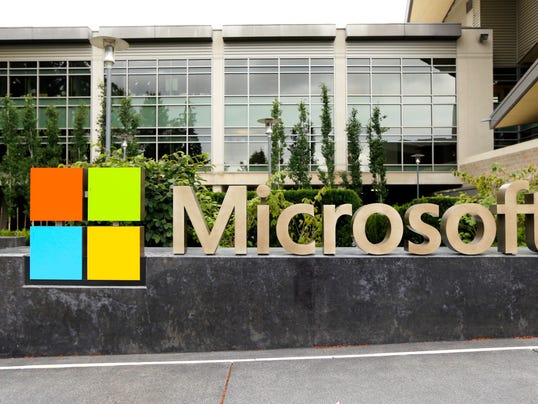 |
| Israeli Prime Minister Benjamin Netanyahu waves to supporters as he delivers a speech in Tel Aviv, Israel, Tuesday. (Photo: Abir Sultan, epa) |
JERUSALEM -- Benjamin Netanyahu's conservative Likud Party held a clear lead over its major opposition party in Israel's elections Tuesday, boosting the prime minister's bid for a fourth term.
Nearly complete results showed Netanyahu's party leading the center-left opposition Zionist Union, which is headed by Isaac Herzog, giving Likud a strong position to try to form a coalition government.
Netanyahu's Likud party appeared on track to win 30 seats in the 120-seat Israeli parliament, to 24 for the Zionist Union, Israeli media including The Jerusalem Post reported early Wednesday.
Netanyahu, who lagged in pre-election polls, declared an early triumph. "Against all odds: a great victory for the Likud, a major victory for the national camp led by the Likud, a major victory for the people of Israel," he tweeted in Hebrew.
With more than 90% of ballots counted, raw vote totals showed Netanyahu's Likud ticket with about 23% of the votes, and Zionist Union at 19%.
Opposition leader Herzog did not concede and said he will try to form a governing coalition.
"I intend to make every effort to put together a true social-welfare-minded government for Israel ... that will seek peace with our neighbors,'' he said.
The results, if upheld when the vote count is complete, will touch off a scramble to build a coalition government.
The outcome could give leverage to Moshe Kahlon, leader of a new centrist party that could deliver support toward a majority. Running in third place in the incomplete results, as well as in TV exit polls of voters, was the United List, a coalition of four small Arab parties that could try to block Netanyahu's return to office.
Exit polls of voters by two Israeli TV outlets showed his party tied with the center-left opposition Zionist Union at 27 seats each in the next Knesset, or parliament. A third station showed Netanyahu narrowly ahead, 28-27. Those polls showed the Arab coalition could win 13 seats.
The exit poll results suggested that Netanyahu's party was doing better than pre-election polls indicated and that a substantial share of voters were willing to give their prime minister another term despite a public feud with President Obama over Iran's nuclear program.
"The atmosphere at the Likud HQ is electrifying," said Avi Hyman, a Likud field coordinator, speaking from Likud headquarters in Tel Aviv.
Voter turnout was 71.8%, up from 67.8% in the 2013 elections.
Opinion polls before the election had shown Herzog with a small lead. The last available poll was published Friday, when a significant number of voters were still undecided, meaning the race was still too close to call.
Under Israel's complicated electoral math, the party with the most seats short of a majority does not necessarily get the prime minister's post, and instead the elections begin a period of negotiations with smaller parties toward building a governing coalition of at least 61 seats in the 120-seat Knesset.
It will be up to the Israeli president, Reuven Rivlin, to decide who to call on to attempt to form the next government. Traditionally that task has gone to the leader of the party that receives the most votes. It could require weeks of political negotiations.
In the closing days of the campaign, Netanyahu moved farther to the right to solidify support among splintered hard-right voters and to galvanize his Likud base.
He pledged to block establishment of a Palestinian state, a reversal from past statements and at odds with much of the international community's support for a two-state solution to the issue. He also tried to rally supporters by warning his leadership was in jeopardy because Israeli Arab voters were turning out "in droves'' to oppose him. Arabs make up 20% of the Israeli population.
But after nine years in the prime minister's job, the election was a referendum on Netanyahu, who angered Obama and jeopardized the bipartisan support Israel has long enjoyed in the United States by speaking to Congress at the invitation of majority Republicans. During his speech, he clashed with Obama over U.S. talks with Iran on curbing that country's nuclear program.
Netanyahu announced his opposition to a Palestinian state Monday and reiterated that pledge early Tuesday after casting his ballot.
His reversal marks a second flash point with the Obama administration, which has been prodding Israel and Palestinians to make progress in peace talks on creation of an independent Palestinian state.
Netanyahu also blamed "foreign funds that flow in vast quantities" to groups supporting the opposition for his party's tough race. It was a veiled reference to the role U.S. donors and a former campaign aide to Obama have played in helping a non-profit group that opposes Netanyahu's policies. His party has been aided by U.S. Republicans.
In a phone interview on the Channel 10 TV, Netanyahu had ruled out forming a coalition government with Herzog saying he would seek an alliance with the ultra-national Jewish Home party, which also opposes Palestinian statehood







